“Dead Things,” by Steven S. DeKnight
“Dead Things” opens with another morsel of quirky BtVS misdirection: we hear something that might, possibly, be fighting. Soon enough, we realize that it’s actually the sweet sound of two special someones getting their Spuff on. Energetically. When they’re done, they converse about crypt decor until Spike finds himself feeling a little weird about the casual, chatty mood Buffy seems to be in.
He ends up asking if Buffy even likes him, and getting a “Sometimes,” in response. It’s not overnice, but at least it’s honest. It also continues the Spike-as-Girl, Buffy-as-Boy gender dynamic you’ve all been discussing, these past few weeks. He’s looking for emotional connection and she throws him the barest dry hint of a bone.
Meanwhile, and speaking of misdirection, our season six decoy villains are on the lam. The Trio is working to settle into a new lair in the wake of Willow’s having located their old one. Perhaps it’s desperation that has made them creative, but the three of them are also merging their various superskill sets. Up until now, it’s mostly been Jonathan does a spell or Andrew summons a monster or Warren builds a weapon. Now, instead, they’re mixing it up, working on a cerebral dampener whose ingredients include gadgetry, a summoned-monster-gland and a little magic.
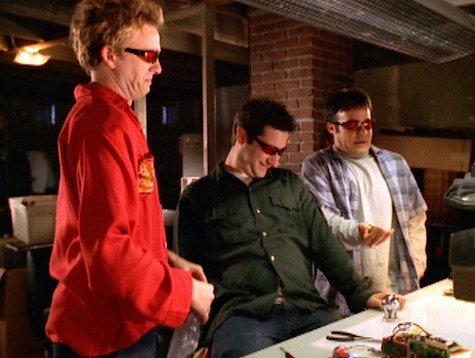
It works. Warren declares that thanks to their shiny new thingy, any woman they desire will become their willing sex slave. He says he knows just where to start, and we’re meant to think he means Buffy.
But no. Warren isn’t quite that dumb. (He’s, like, 0.5% less dumb than that.) Anyway, Buffy is too busy to sex slave, as she’s over at Doublemeat Palace, handing out burgers and waiting on Tara. As the two briefly take in the misery of her menial day job, we learn that Tara thinks Buffy called her to talk about some magical misbehavior of Willow’s.
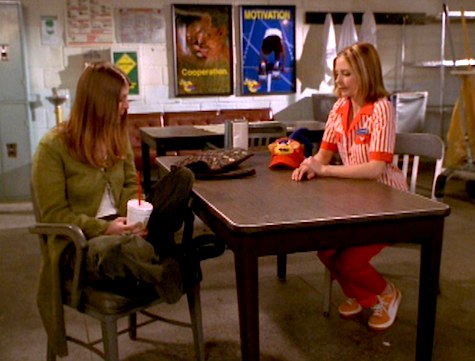
In fact, Buffy wants to know why Spike can hit her. She can’t very well ask her BFF, can she? She wants to know if the spell that brought her back did, as he asserts, bring her back “wrong.” Tara very sweetly assures her that this can’t be true, but when Buffy presses her for evidence or facts, or anything more than her opinion, she agrees to double-check.
Speaking of things that are wrong-so-very-wrong, the Trio is working on its first official abduction of an unwilling woman. Jonathan and Andrew think they’re shopping for a random victim, which is squicky enough. Warren, as usual, has an additional plan he hasn’t mentioned. There’s always something with this guy: he’s like one of those allegedly free apps that doesn’t work very well unless you buy into something extra for $3.99.
This time, the real plan involves enslaving his former girlfriend, Katrina. Oh, Warren. The best thing we can say about you is that you have a long attention span.
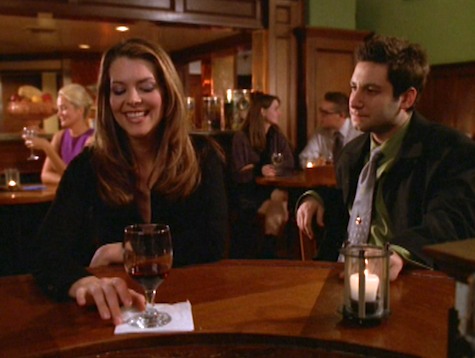
Warren does try talking to Katrina first, to see if there’s any chance they can work out their issues. She responds with a completely reasonable level of “Get the hell away from me, you total pervy creep.” Needless to say, he zaps her.
Like that, she goes from “You’re sick,” to “I love you, Master.”
Buffy arrives home to find her friends and sister practicing dance moves. She is briefly concerned that Sweet has returned for another rousing adventure in hellmouth musical theater. But no—it’s just prep for the XandAnya wedding reception. Dawn heads off for a sleepover, snarking about how she couldn’t possibly have known Buffy was home and available to spend time with her. Despite obvious hurt over this, Buffy opts to go with her friends to drown some sorrows at the Bronze.
By now the Trio has dressed Katrina in a French maid outfit, and they’re openly gloating over their plan to screw her. Warren takes her into the back room, and there the spell wears off.
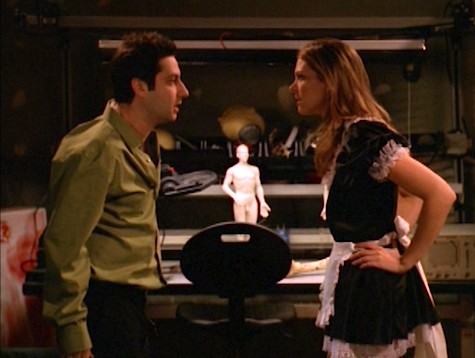
The scene that follows is deeply discomfiting. It’s an eye-opener for Andrew and Jonathan, who allegedly haven’t considered that what they’re up to is rape until Katrina bellows the word at the top of her assertive and outraged lungs.
“Who, us?” seems to be their attitude.
I want to be especially disappointed in Jonathan, for whom I have a soft spot. But that’s the point, really. We’re meant to be uncomfortable. Jonathan’s had his likable moments. He’s someone we’ve known for years. Sure, he may have his flaws. They may even be, arguably, pretty big personality deficits. But that’s Jonathan for you. He’s not a creep.
Except, gosh, he actually kind of is! Remember he was on board for the proposed peeping Trio outing in “Gone?” And what about the twins in “Superstar?”
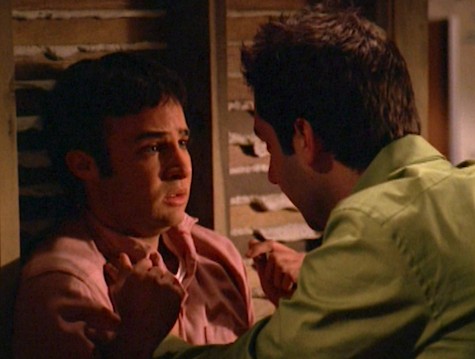
This doesn’t make him an effective predator. A skirmish follows. Katrina gets in good licks on both of the Junior Two—go you, girl!—but before she can escape, Warren kills her.
The murder throws the Trio into convulsions of panic, recrimination and remorse and, above all, OMG, what do we do now? Andrew and Jonathan suggest turning themselves in. Warren vetoes this, moving them on to disgusting suggestions for getting rid of the body, like finding a demon big enough to eat it.
Then Warren decides to bring Buffy into the mix.
I bet the bunch of us could come up with forty kazillion better ways to cover up a homicide in Sunnydale than “Make the Slayer think she did it.” I’d start, at the top of the list, with “fake a vamp attack.” Granted, that also would get the Slayer involved. So… cerebral dampen someone into putting the corpse in their trunk and driving the heck to L.A.? Or… isn’t there a desert conveniently close to town, with a hungry mystic kitty in it? I bet he’s tired of lizards and magic kibble.
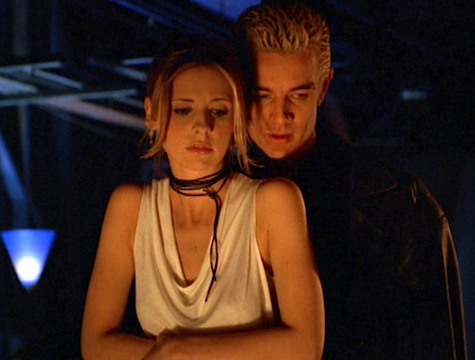
Over at the Bronze and all unawares, the gang is cutting loose on the dance floor. Somehow Buffy ends up on the bad girl walkway* above them, with Spike, having sex yet again while he tells her this is, essentially, inevitable. His argument is that she, like him, is a creature of darkness.
*That walkway is seeing a lot of naughty behavior lately. Willow and Amy were working their destructive magic tricks from up there, a few episodes earlier.
Next day, Willow is headed to the Magic Box and she runs into Tara, who is dutifully embarking on Buffy Wrongness Research. Willow reveals that she’s been spell-free for over a month. It’s an awkward convo, but Tara’s glad for her. A certain amount of WillTara healing is definitely underway.
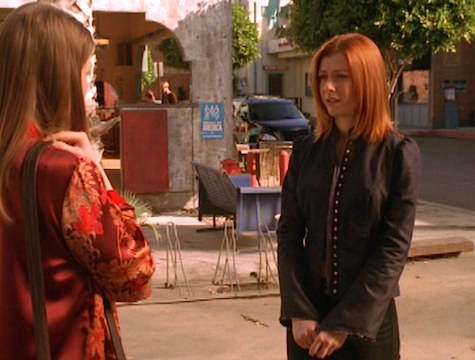
And Buffy’s in the graveyard, pondering what Spike has said. She ends up at his place. There’s some sexy wall-leaning both inside and out of the crypt—they’re basically trying to spuff through the concrete, but she finds the strength to walk away.
As Buffy tries to think about something other than the evil bloodsucking fiend, she hears a scream. Oh frabjous night! Off she skips to the rescue.
She runs into a fray which is dreamy and confusing. Spike shows up and there’s some possibly real and possibly unreal fighting. Demons keep charging and vanishing, and Katrina—who is actually Jonathan, shapeshifted—does some fleeing and screaming. Eventually she flees into the path of Buffy’s right cross.
When the time distortion clears and they find Katrina’s body, it all seems at first glance as if she’s been Slayerpunched to death. Spike hauls Buffy away, tries to calm her down and eventually takes her home to bed.
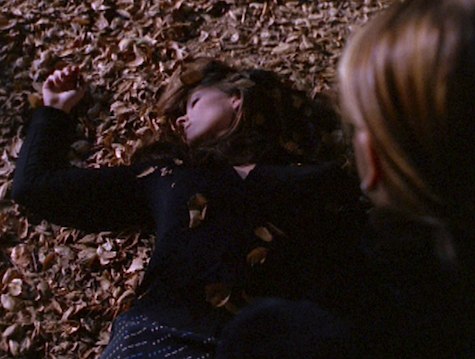
In many ways, he is pretty okay with this turn of events. It offers the possibility of drawing Buffy further into the shadows, where Spike is so desperately trying to keep her. At this point in their relationship, he is making a deliberate, conscious and concerted attempt to convince Buffy that she is, essentially, bad.
One of the things we have been talking about is whether it’s important that Spike regain his ability to hit Buffy as they moved into the sexual phase of their relationship. Some of you argued that if he’d remained physically helpless, he might still have emotionally abused her. I’d argue that this sales pitch for the dark side is emotional abuse. Spike wants Buffy to believe she is evil because it gives him some measure of control in their relationship. If she believes she’s not human, he can more easily isolate her from her friends. If she’s all alone, she’s apt to stay with him, and eventually give him the love he craves.
He’s reacting to the little glimmers of warmth she keeps feeding him, but he has also misjudged this particular button of hers.
Buffy always falls apart when she thinks she’s killed an innocent. She was a mess when Ted seemed dead, and her horror over the death of the Mayor’s assistant, in season three, was epic. She and Faith chewed over many of the same arguments that Spike offers here as reasons for why she shouldn’t surrender herself to the cops. But it only takes one terrible, guilt-ridden dream to convince Buffy to confess. She tells Dawn, who trots out her abandonment issues with predictable tiresomeness.
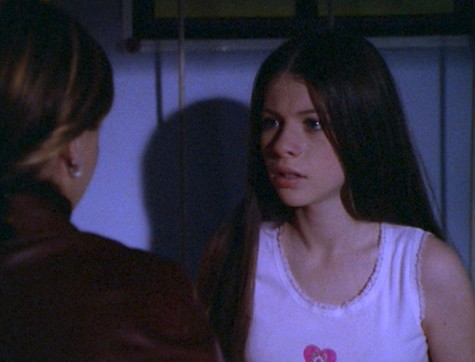
Buffy heads for the police station, and Spike tries to stop her. He’s ditched the body—though not competently. They break into a fight over whether or not he truly loves her and whether she is or isn’t going to do the right thing. He pushes, he argues, he all but drags her away from the police station. He invites her to put ‘it’—meaning all her rage, pain and guilt—on him and eventually she does just that, absolutely whaling on him.
So there’s this horrible beating. Spike doesn’t fight back and he gets very seriously tenderized. It’s consistent with the “go on and be bad,” strategy. It’s also a wretched pile of awfulness. We’re all uncomfortable again.
She’s depressed. He’s actively trying to convince her she’s demonic and above the law. She’s trying to obey the rules of decent human behavior by taking responsibility for a mistake—admittedly, in a way that might get her out of her current difficult circumstances. He’s trying to cover up a crime and absolutely doesn’t give a crap about the victim.
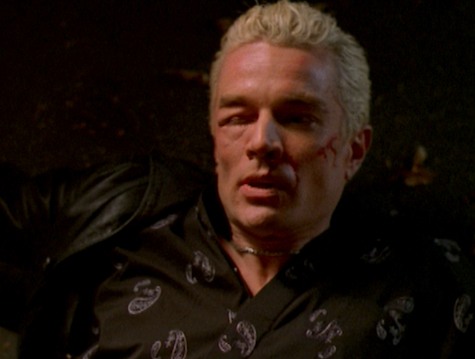
How do you sift the right from the wrong in this?
The fight, if you can call it that, merely confirms Buffy’s powerful desire to turn herself over to the forces of law and order. But while she’s waiting to be seen, she overhears Katrina’s name. The connection to Warren is too obvious to ignore. Plus she remembers Spike’s parting shot: you always hurt the one you love.
So instead of getting Sunnydale’s finest to slap the cuffs on, she zooms over to the Magic Box, where Anya identifies the time distortion demons and the Scoobies piece together what happened.
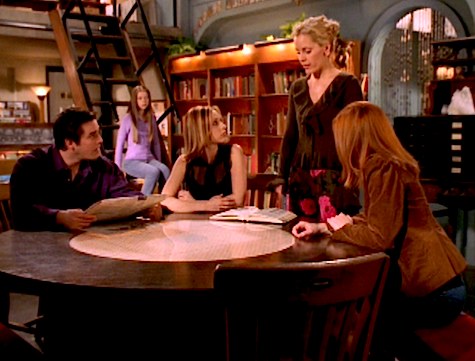
The police never catch up, and so the Trio concludes that they got away with murder. Andrew says this is cool. Jonathan reluctantly claims to agree.
In the final scene of “Dead Things,” Tara tells Buffy that her basic molecular structure was altered in her big undeadening, and the result is just enough to confuse Spike’s chip. Buffy, goggle-eyed with denial, tells her about the sex. And when Tara’s incredibly sweet and completely non-judgmental, and goes so far as to say some (measured) nice things about Spike, Buffy loses her mind with grief and guilt, melts down, and begs Tara not to forgive her.
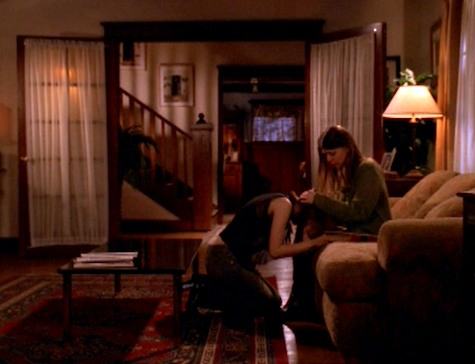
On that happy note, I’m left to mention that at least the end credits still have peppy music.
Next: Dawn the Lightfingered gets her Curse On
A.M. Dellamonica has tons of fiction up here on Tor.com! Her ‘baby werewolf has two mommies,’ story, “The Cage,” made the Locus Recommended Reading List for 2010. There’s also “Among the Silvering Herd,” the first of a series of stories called The Gales. (Watch for the second Gale, story too—“The Ugly Woman of Castello di Putti”!)
Or if you like, check out her sexy novelette, “Wild Things,” that ties into the world of her award winning novel Indigo Springs and its sequel, Blue Magic.










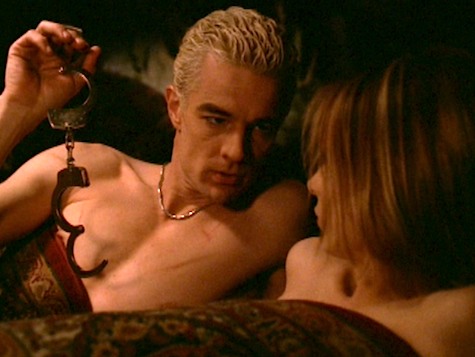
That final scene with Tara left this watcher at least in a state of awe for Tara. I believed in her capacity to be the wise woman and the comforter and the counselor. I was also in state of sympathic breakdown misery on Buffy’s behalf. This is one of the most powerful, if not the most powerful, single scenes in the 7 seasons. It could so easily have gone wrong, but the two actresses were — or so they seem — perfectly in sync with each other and the material.
A separation from Willow seems to have been a productive growth period for Tara. Which is another reason we’re all so angry at the wrongness, the unfairness, of Tara’s sudden, meaningless death. She was just beginning to grow into the might witch that she would be. A different witch from Willow and her powers, yet powers that are essential to the world’s continuance and growth. Together they’d have been able to make this earth a much better place.
Love, C.
“Dead Things”, in which everyone suffers, and it’s great drama. I can’t really say I enjoy this episode, but it’s so well done. Wareen and Spike are uncomfortable and creepy, just as they should be, given their actions. The final scene with Tara is incredibly powerful.
Thanks for doing this rewatch, I’ve been reading along for a while but never commented.
I’ve always found this episode to be extremely disturbing, the Trio have always seemed endearing but honestly this is the episode where they cross a line that they can’t come back from. Obviously Warren is the really bad one but that doesn’t excuse Jonathon and Andrew from their actions and their involvement. This episode is also really powerful for Buffy and I have always found Tara to be like a mother to the Summer’s girls and so the scene at the end fits perfectly with this idea.
This is one of the creepiest episodes for me because of what it reveals about Warren’s misogyny. Katrina isn’t killed by a death ray or demon; just an ordinary human being with a hatred of women.
A brilliant write-up of the episode – well done!
Both of the last two seasons of BtVS come in for a fair bit of criticism, but one thing that I don’t think even the most vehement critics would deny is that they both contain some of the most outstanding individual episodes in the series. “Dead Things” is to me one of those episodes.
I think it’s fair to say that the key topics of discussion here boil down to the ongoing development of Buffy’s twisted relationship with Spike, her sinking to the first of the two nadirs in her season-long struggle with depression (the other being of course in “Normal Again”, and the big reveal that the Trio, who up until now have never seemed like they’d amount to more than a bad joke, have through neglect been permitted to grow into something seriously nasty.
To take the last one first – I commented in the last thread that I believe the Trio can be read as a metaphorical representation for Buffy’s Depression, and I think that reading stands up in “Dead Things” more than any other episode. It works on a number of levels: just as the audience is delivered a strong wake-up call that the Trio’s antics are not only spinning out of control but also pose a potentially lethal danger to those that they come upon, it’s also becoming glaringly apparent that Buffy’s continued slide into depression and her efforts to cope with it – particularly by becoming increasingly intimate with Spike – could have consequences that extend far beyond the suckiness of her personal situation (I’ll come back to that one in a moment). Conversations in the previous comment-threads have picked up several times on the repeated failure of the characters to take an effective/pro-active approach to dealing with the problems confronting them in this season, and there’s a non-coincidental double-helping of that here. The Scooby Gang have up to this point failed to treat Warren, Andrew & Jonathan seriously as a threat (or even take notice of them, for the most part), and that neglect has let them grow into a three-headed monstrosity (although at least one head feels uneasy about it). Likewise, the fact that Buffy is struggling so badly at the moment is at least partly attributable I feel to the studied obliviousness of her friends to what exactly is happening with her. The scene in the Bronze more or less epitomizes it – the Scoobies need only look up, and they would plainly see just how much emotional trouble Buffy is getting herself into, but they don’t.
(On a more positive note concerning Buffy, amidst all the darkness of this episode I did find it heart-warming that even at her lowest point she still makes the effort to ask Willow how she’s doing coping with her problem)
As a final comment on the Trio, apart from their metaphorical role in the story-arc, their role as characters in their own right shouldn’t go unremarked. In some ways they fall into a pattern recognizable to the show, which has in several previous seasons made use of the ‘decoy Big Bad’ (although never so much as in this season). More than that however, they are I think quite a brilliant onscreen portrayal of some of the destructive emotional tendancies and toxic worldviews that isolated young men can fall prey to, and this is what gives them their greatest resonance as characters. I could write about this at length in my own words, but instead I’m simply going to heartily recommend reading this article by Alyssa Rosenberg, which articulates my thoughts on this subject very well.
Back to Buffy/Spike. I’ve seen a lot of good thought expressed about the development of their troubled relationship over this season, but the reading that still strikes me as most compelling is that for Buffy, it started out as an escape mechanism more than anything else. She began to be sexually attracted towards him quite early in the season, driven in part by a sense that having experienced death herself and become detatched from the world of the living, Spike was no longer ‘beneath her’ as he was before the end of Season 5 – feelings greatly exacerbated after she came to believe that she had lost some of her humanity in being brought back from the dead.
(As a side-note, one of the reasons that Tara’s heart-breakingly beautiful response to Buffy’s confiding and confession to her struck me as compellingly in-character, was that one would expect her to have a great deal of sympathy for anyone who acted badly out of a belief that they were partly non-human, as she herself did prior to the events of “Family”)
More to the point though, is that since “After Life” Buffy has been forcibly repressing her deeply negative emotional reaction to being resurrected, and Spike offered a convient outlet for that. Buffy is quite aware that she was brought back for two big things: because her friends and family wanted and needed her, and to answer the continuing call of her destiny as the Slayer. Needless to say, on a certain level she’s consequently resenting the hell out of both things – and in Spike, she has the perfect opportunity to act on that resentment. Having a relationship with him is simultaneously a way of saying “screw it” to her responsibility as the Slayer, and a way of getting away from her friends by escaping temporarily into the darkness that Spike is perpetually tempting her with.
That’s fine in and of itself, but now the consequences are really starting to catch up with her. Not only is she driving a wedge between herself and the people who love her, it’s now being brought home that rejecting her identity as the Slayer can be lethal for any number of innocent victims of the creatures of darkness – creatures like Spike. Moreover, as much as sleeping with Spike might have been great for temporary relief, it’s taking a terrible toll on her in that she’s lowering and degrading herself for the sake of being with him (her breakdown in the alley as she beats on him is emotionally shattering to watch), and she now no longer even has the excuse of having “come back wrong” to justify it.
What makes it all the worse is that she’s increasingly having to wake up to the fact that he does in fact sincerely love her in his own way, thereby adding to the guilt she feels for using and abusing him in the way that she does. Matters might have been different if she was able to have a relationship with him in which she brought him up to her level instead of descending to his, but that’s not something that either of them are capable of at the moment (and they won’t be until Season 7, by which point Buffy has recommited to the world of the living, and Spike has gained the soul that will permit him to have genuine moral agency for the first time). A lot of this is going to come to a head in “As You Were” – unfortunately one of the lesser episodes in this season, but still a pivotal one in the ongoing development of the Buffy/Spike relationship.
As one final note, the two lines that most jumped out at me in the entire episode when I rewatched it, were these, from Buffy’s confrontation with Spike outside the police station:
Spike: “… I love you.”
Buffy: “No, you don’t.”
This is of course an exact echo of their final words to each other in “Chosen”, and may offer a key to interpreting that later scene, which is the climax of their relationship (and, arguably of the entire show). Just something I noticed.
I hadn’t caught the “I love you” / “No, you don’t.” Thank you for pointing that out!
As difficult as this ep is, it’s far meatier (ha-ha) than the last one.
We’ve talked in the past about Spike representing Buffy’s Inner Slayer/Inner Darkness and we get more of that here. As awful as things are, Buffy needs that strength just to keep going. At the same time, she resents it, and she’s very much in denial.
IMO, the thrust of the series, especially the last two seasons, is about Buffy integrating her Slayerness; striking a balance between being the Slayer and being herself. That will come to a head in Seeing Red.
We also see a lot of parallels being drawn here:
Spike uses Faith’s arguement to try talking Buffy out of going to the cops. It’s the “want, take, have” school of thought. It’s about being unruly and outside the law.
Becoming a vampire was, for William, less about being evil and more an escape from his own rule-bound and repressed existence.
Spike is the target of Buffy’s self-loathing, just as Buffy was the target of Faith’s self-loathing.
Images of Spike in handcuffs are juxtiposed with images of Katrina in handcuffs. Spike is Buffy’s Katrina.
Buffy is Spike’s Warren.
Other observations:
Spike taking Buffy to bed is not “real.” It’s about how easy it would be for her to relax and leave everything to Spike/the Slayer.
You’d think Spike, after a century and change, would be able to dispose of a body.
Warren wants to escape his responsibility in Katrina’s death. Ditching her body is protecting himself. Spike doing it is (in his mind) protecting someone else. Warren doesn’t care, even tho’ he knew her. Spike didn’t know her.
Spike is literally “asking for it” in the alley scene.
It is significant on many levels in terms of the relationships in this series that the one to whom Buffy chooses to ‘confess’ is Tara — and that Tara is exactly the right, best choice she could have made.
Which juxtaposes in the most shocking to the expectations way with the scene in which Buffy runs down the season to the reappeared Giles, “And I slept with Spike,” and Giles just cracks up, and the two of them roll on the floor, weeping with laughter.
This is the very last thing we expected, and it was so right.
@7. Good point on Spike as representing Buffy’s Inner Slayer/Inner Darkness. I hadn’t thought of that interpretation, but I like it.
Regarding the last two seasons, I’ve seen it suggested that S.6 & S.7 are distinct from the previous five seasons, in that they ought to be read as comprising a single extended two-year arc which really comes to completion with Chosen. Certain statements from Joss Whedon himself – to the effect that looking at S.7 as a story is the key to understanding S.6 – definitely seem to support this, and so do a number of aspects about the ending of the sixth season: it’s the only one in the series that closes with a cliffhanger, and with multiple issues concerning the main characters left pointedly unresolved. Whedon has described himself as something of a fanatic about getting adequate closure in fiction, and supposedly the first five season finals of BtVS were all written so that they could potentially serve as the series finale if the show was discontinued. When S.6 began it had moved to a different network, and the writers knew from the get-go that they were going to be working with two seasons.
Concerning the overall “thrust” of the series, if Buffy’s seven-season arc is concieved in terms of Campbell’s hero’s journey, then her self-sacrifice at the end of S.5 fits neatly as the end of the second stage, with S.6 marking the point where she must confront the Return From Death (literally, as it happens). From this perspective, it’s easy to see where Whedon was coming from when he stated that “Life itself” is meant to be the Big Bad of the penultimate season (in that sense, Dark Willow is just as much a decoy antagonist as the Trio were). Buffy’s triumph in this season is that she finally succeeds in facing the challenge she posed to Dawn at the end of S.5 (aka “the hardest thing in this world is to live in it”). The Ur-theme of the seventh season is summed up by the arc words “It’s about power” – specifically it’s about Buffy discovering and confronting the limits of her own power, and overcoming them through realising her ability to act to empower the people around her as well as protect them – her personal form of the Ultimate Boon, which takes the physical manifestation of the Scythe that she discovers, and uses to enable her and her friends to defeat the First Evil.
Concerning the Buffy/Spike confrontation in the alley, the parallels with Faith are definitely there. Not only to Spike’s arguments smack of Faith’s arguments in Consequences, Buffy’s subsequent breakdown bears more than a passing resemblance to the end of Who Are You?
Alex C. Thank you. I wish I could take credit for the idea, but I saw that interpretation put forward by another, and found it resonated for me.
I also had Campbell’s Hero’s Journey in mind. s6 is not just The Return from Death, it’s the Reluctant Return.
Who Are You? is exactly the ep I had in mind. I was also thinking, ironically, of Something Blue. Specifically, the scene with the cake topper. Spike says the groom looks “insipid.” Buffy’s solution? Smearing red paint on his mouth (“The Blood of the Innocent.”)
I think it’s this darkness in Buffy that is Spike’s “revelation.” He interprets it as being similar to his own, and he’s not entirely wrong. We will see in s7 that their power comes from the same source.
You’d think Spike, after a century and change, would be able to dispose of a body.
But old Spike just preferred to leave them out where people could find them and be appalled.
It’s of a piece with his “Sod it, they’re in the factory” slapdash approach to crime. He doesn’t think of himself as a Moriarty and he can’t be bothered to obsess about the details, even when he should.
@10. I think it’s this darkness in Buffy that is Spike’s “revelation.”
I think that you’re definitely onto something there. From that, one might further note that Spike’s infatuation with Buffy first manifests itself properly in S.5, not long after the exploration of her “inner darkness” becomes an explicit theme in the show.
Branching out still further, if we consider “finding power/true nature through inner darkness” to be the Ur-theme of the final two/three seasons, then it does a lot to make sense of the parallel that the writers were obviously attempting to set up between the arcs of Buffy and Willow, which does not always succeed on a dramatic level, at least in this season (here we return to the much-hashed issue of the strong “resurrection depression” vs weak “magical drug addiction”), but which can then be seen as vitally important on a thematic level.
Which brings us back to what happens by the end of this season. The flip side of Buffy and Willow both finding power (of a sort) in darkness is that they both get lost in it, and consequently bring about little except destruction, until they can figure out how to temper it with a bit of light.
@11. That’s pretty much it in a nutshell. Spike can bring a lot of ferocity and badass attitude to any fight that he happens to get into, but he’s consistently shown little aptitude and still less inclination to act as a schemer. Ever since he first appeared on the show in School Hard, I can’t think of a single plot that he’s come up with by himself that hasn’t fallen to pieces to great comedic effect (it’s part of why we love him). The single big exception was when he spent most of the second half of S.2 feigning the extent of his injuries, until he joined forces with Buffy in the finale (which as a whole still counts as his Crowning Moment of Awsome).
All told, by the time we roll around to As You Were, it’s hard not to (sadly) agree with Buffy’s sentiment that Spike couldn’t possibly be an international mystical arms smuggler – he’s too incompetent for that kind of job. As, sadly, turned out to be the case. :(
As with several episodes this season, this episode is intense, even riveting in places, but can’t really be said to be “enjoyable” in the sense that you have fun watching it. Warren’s sudden swirve from campy Batman-villain style “crimes” involving freeze-rays and invisibility rays into brutal murder and rape is disturbing, and Buffy’s meltdown at the end is painful to watch, as is her really severe pummeling of an unresisting Spike.
Planning is not Spike’s strong suit, no. Bless him.
Re: Buffy confessing to Tara, I have also seen Buffy’s situation likened to that of a closeted gay person. Rather than dragging her deeper into the darkness, Spike wants to be out in the open. In Gone, he says to her “You’re here because you’re not here.” That’s why he’s upset. In Normal Again he’ll challenge her to tell her friends about them. He wants a repeat of that scene from Spiral, when she tells Xander and Giles that he’s part of the group, so STFU.
I don’t think he’s being entirely unreasonable, since it’s already happened once (sorta), but she’s just not ready.
Spike usually comes across to me as smarter than Angel, and yet Angel proves to be capable of creating the elaborate plan, requiring much forethought, to kill the Senior Partners in the last few episodes of ANGEL. I can’t see Spike being able to do that. His mind just doesn’t work that way–he’s much more impulsive, and tends to wing it and do things on the spur of the moment.
Spike usually comes across to me as smarter than Angel, and yet Angel proves to be capable of creating the elaborate plan, requiring much forethought, to kill the Senior Partners in the last few episodes of ANGEL. I can’t see Spike being able to do that. His mind just doesn’t work that way–he’s much more impulsive, and tends to wing it and do things on the spur of the moment.
@14. I guess it’s all just a matter of subjective taste. Personally I found the ‘dark’ tone and themes of S.6 to be highly enjoyable in the episodes where the execution worked out (especially this episode and Normal Again), even if it is a different type of enjoyment to that inspired by the more light-hearted episodes in the series. Still, each to his own.
Where I would disagree with you is that the reveal of the Trio, and Warren in particular, as capable of this kind of naked brutality constitutes any sort of “sudden swerve.” There have been hints and foreshadowing, sometimes quite blatant ones, in almost every appearance that the Trio have put in since the beginning that Warren is in fact a monster (of the all-to-human variety), and Jonathan and Andrew are his dupes. The underlying sinister nature of what they’re getting up to has also been there from the beginning for anyone who looks for it – the only reason that the audience doesn’t see it is because it’s veiled in the sort of campiness and revenge of the nerds-esque overtones that you refer to – until the veil gets ripped off. Even their plan in this episode – to use a mystical device to hypnotize a girl for their own purposes – seems like just more of the silly same until Katrina drops the bombshell by throwing in their faces what this really is. It’s a very effective piece of development, and I liked it.
@15.
That may be a part of it, but I would still maintain that it works the other way as well. It’s not just that Buffy isn’t ready to “come out” about the nature of her relationship with Spike – Spike isn’t ready for it either, no matter what he himself might think about the matter. It’s obvious that he’s sincere about loving her and wanting to be with her, and he’s rediscovering pieces of his humanity in that, but it’s made glaringly obvious again and again that he still has zero capacity to exhibit genuine moral agency, and more often than not Exhibit A. for this is located squarely in the way that he treats her.
As you noted earlier, the central thrust of the series lies in Buffy learning how to properly integrate her Slayerness with her humanity, and as of the moment, being with Spike can only mean giving up on a huge part of the latter. As much as reconciling with her inner darkness might be important for Buffy’s greater arc over the series, in this particular season the central challenge that she’s facing stems from the fact that she did embrace her inner Darkness/Death at the end of S.5, and now needs to find a way to recommit to the Living (it’s no coincidence that most of her amorous liasons with Spike are depicted as seperating her from Dawn or her friends in some way). Spike stands in as representative of the comforts/peace that she lost when Willow resurrected her, and thus becomes the temptation that she has to reject, at least for the moment.
The fact that neither Buffy or Spike really understand this is what leads them squarely to the tragic pass in Seeing Red. From there, they both end up in some very dark spots, but are ultimately positioned to begin reaching a genuine reconciliation and understanding with each other over the course of Season Seven.
In Intervention (sigh), the ‘bot recognizes Buffy’s friends in part b/c Spike recognizes that Buffy isn’t Buffy w/o them. In Fool For Love (sigh), Spike tells her how profound and empowering embracing the darkness was for him. That’s what he wants for her.
As for Moral Agency, you have a good point, but Spike has to choose it in the first place, which shouldn’t be possible. The way they frame it suggests he’s not thinking of it like that, but that’s how it is.
Buffy openly acknowledged her love for Angel. There’s one thing Angel had that Spike didn’t, so he goes to get it. Just like in Intervention and Family, Spike makes a moral choice out of love.
On the whole, I’m glad Spike evolved as he did, but in many ways ‘ok’ Spike was my favorite incarnation of the character. He didn’t do the right thing ‘cuz it was the right thing to do. When he did the right thing, he did it for his own idiosyncratic reasons.
The pain that you feel/
You only can heal/
By living/
You have to go on living/
So one of us is living
Spike understands this. He himself is living vicariously thru Buffy (kinda like us). Her friends, her sister…these are the people in his unlife, aside from Clem and his poker buddies.
@20.
That is a part of it, sure, but I think that there’s also a lot, lot more to Spike’s decision to seek out a means of restoring his soul than that. As he says to Clem in their conversation in his crypt just before he leaves town, he’s reached a point where he is forced to acknowledge that, in his own words he can no longer “be a monster” (not just because of the chip in his head – he has the capacity to hurt Buffy, but he doesn’t want to), but he also “can’t be a man”, and therefore he can only conclude that he must be “nothing.” He gets forced to confront this basic truth about himself by the fact that he has just utterly and completely broken the promise that he had earlier made to Buffy: “I don’t hurt you.” It is this event that forces him to begin to come to truly grips for the first time with the image of himself that Buffy sees: a creature who is not only less than a man, but is incapable of becoming one, and who therefore cannot be loved.
At that point he has his epiphany:
“CLEM: Hey. Come on now, Mr. Negative. You never know what’s just around the corner. Things change.
SPIKE: They do… If you make them.”
I could write on about this at some length, but I suspect we are going to talk about this a lot more in relation to the episodes to come, and so I will simply link to this essay, which I think has a pretty good handle on the issue.
…….
Looked at from Buffy’s perspective, while it can seem to the viewer that she can be really hard (in many, many senses of the word) on Spike in this season, I do basically sympathize, and even agree with her in her belief that she cannot love him and treat him as an equal (the necessary basis for any true relationship/partnership) as long as he remains the way that he is at the moment. This all ties back to her devastation at the news that she gets from Tara in this episode that she herself is still fully human – up until now, she had been able to justify her actions by thinking that she had sunk to his level, when in fact the gulf between them still exists. It is rendered still more complex by her being forced to acknowledge the authenticity of his love for her, which adds to her sense of disgust with herself for using him in the way that she has been.
@22. I completely agree with you that Spike made the change as much for himself as he did for Buffy. All the little changes are leading up to it. I brought up the comparison with Angel as part of how ME chose to present Spike’s soul quest. It was never really made clear (unfortunately) that Spike absolutely had a soul in mind as his goal. However, Spike would think this way, and he says as much in Beneath You.
It also goes back to Spike and the planning thing. At the time, I (and others) thought it was just another one of Spike’s plans gone awry; a careful-what-you-wish-for sort of thing. I could easily imagine him going off half-cocked without thinking through the consequences.
As I said, I appreciate his evolution. It’s not something you see very often in a TV character. However, it’s also my understanding that it wasn’t initially part of the plan. That and it comes across as Spike changing so Buffy doesn’t have to. I find it ironic that the second banana should show (arguably) more character development than the title character.
What’s more, Buffy hurts Spike in this ep. and Warren kills Katrina. Clearly, having a soul is no guarantee of anything. In Seeing Red, he goes to talk to Buffy, who, as usual, doesn’t want to listen. A crime of passion is still a crime, but that wasn’t his intent.
Spike is so far along on his journey that, to me, a soul seems almost superfluous. He is capable of morally correct acts, even if he doesn’t see them that way. He will apologize (and mean it!) to Buffy in Hell’s Bells. He has a brain and he’s capable of using it. He isn’t sorry for the bad old days, but sorry won’t change anything. ‘Go, and sin no more’ would be enough for me.
@23 & 24.
I think that we’re getting at the root of the matter in our disagreement WRT to Spike’s character development. I strongly disagree that Spike regaining his soul at the end of the season is “almost superfluous” to his journey. I know that the debate over the significance of possessing a soul was and is one of the most contentious issues of debate amongst the Buffyverse fandom (I think the term “soul canon” was coined over it), but for myself I come down strongly on the side that sees it as very important indeed, and a crucial step for Spike on his journey.
Any number of examples can be cited from the show to demonstrate that in the Buffyverse, the posession of a soul does not preclude a being from acts of evil (we get arguably the greatest example at the end of this season, when Willow presumably retains her soul whilst going on a rampage that culminates in an attempt to destroy the entire planet). Likewise, the absence of a soul does not necessarily preclude one from being more or less benevolent (Clem is a case in point). Despite this, the show still leaves no room for doubt that a creature who lacks a soul is always going to be fundamentally incapable of percieving the difference between ‘right’ and ‘wrong’ (a person with a soul might fail to do this, but a demon without one cannot do this), and is therefore always going to be prone to being driven by their worst instincts, unless somehow constrained by circumstances (apart from the seemingly unique case of Spike, who is chipped as well as in love, there also seems to exist a wide sub-class of demons in Sunnydale, who live basically civilized lives, because they know that it’s the only way to stop Buffy from killing them).
That brings us to Spike. As much as he grows a lot as a character from his first appearance in season 2, up to his re-ensoulment at the end of this season, the show goes out of its way again and again to reaffirm for the audience that he hasn’t progressed morally in the slightest. As much as his love for Buffy motivates him to commit ‘good’ deeds not only for her, but also for her family, we also can’t forget that he tried to go back to killing people as soon as he thought that his chip wasn’t working anymore, or that in this episode he’s echoing almost word for word Faith’s perverse pseudo-utilitarian justifications for manslaughter to absolve Buffy for (as far as they know) killing Katrina. He’s not a good person, and “go, and sin no more” wouldn’t work for him because he doesn’t know what sin is – he just knows what pain is, and he doesn’t want to inflict it on Buffy, but is going to find that he can’t stop himself from doing so anyway. Hence the decision to seek the recovery of his soul. At the end of S.5 he noted that Buffy treats him, and makes him feel “like a man”. By getting his soul back he can actually be a man again, and gain the potential to be worthy in her eyes for the first time – so that she doesn’t feel like she has to “lower herself” in order to be with him.
That brings us back to Buffy herself. I disagree with you that the development of their relationship over the final two seasons of the show is a matter of “Spike changing so Buffy doesn’t have to”. Buffy changes quite a bit over the last seasons, in ways that are consistent with the overall character arc that she’s been following since the beginning of the show. To once again shamelessly borrow the arguments of someone who can phrase it better than I can:
To me, Buffy’s relationship with Spike was ultimately the key to the resolution of this aspect of her character arc, just as his relationship with her was ultimately the key to resolving his central arc. Their relationship with each other in Season 6 is doomed because they fail to understand both each other and themselves. Buffy sees Spike as little more than a walking embodiment of other-worldly darkness that she can use to enjoy temporary oblivion as a means of escaping from the hell that her life has become. For his part, Spike sees her as a fellow Creature of the Night, who needs to be guided to realize her true nature so that they can be together. Both of them are completely wrong in these assumptions, and eventually discover as much: Buffy comes to terms with the fact that Spike has very human and very genuine feelings of love for her, even if he is not himself human; while Spike eventually sees that his fixation on Buffy’s “inner darkness” side has blinded him to the human side of who she is, and that this is what really prevents them from being together.
Spike changes himself for Buffy’s sake, and ultimately becomes the key to helping her realize her big change: that she is still very capable of love and connection. I’ve gone on long enough at this point, so I’ll just leave it in the hands of this link to a truly exceptional analysis of the climactic moment in Chosen.
I see what you’re saying, and I really appreciate the link. The thing is, even with a soul, Spike isn’t (technically) a man. However, by this point he’s become a person. It is IMO a subtle (unconcious?) form of discrimination. However, my views on this have been strongly influenced by one of my favorite fanfic authors Barb C. (aka rahirah). She has an entire series of stories with Buffy and unsouled Spike as a couple – going AU after The Gift that are highly enjoyable and entirely in character.
It looks like a plan gone awry, at the end of S6. I never entirely trusted later assertions that Spike knew he’d end up souled at the end of the quest.
This just means that particular emotional note didn’t ring true for me, not that it isn’t canon. There are so few of these in the BtVS run that I remember them all.
@22 et seq.
Later canon (and the Law of Sympathy) imply that the connexion Angel has with Drusilla and Spike may give then a touch of soul to begin-with….
I’ve been struck by Spike’s arc being in some way a rejection of Calvinism, whose doctrine of Total Depravity, as I understand it, holds that absent G-d’s Grace the ‘natural [hu]man’ can’t even truly want Salvation.
@22 et seq.
Later canon (and the Law of Sympathy) imply that the connexion Angel has with Drusilla and Spike may give then a touch of soul to begin-with….
I’ve been struck by Spike’s arc being in some way a rejection of Calvinism, whose doctrine of Total Depravity, as I understand it, holds that absent G-d’s Grace the ‘natural [hu]man’ can’t even truly want Salvation.